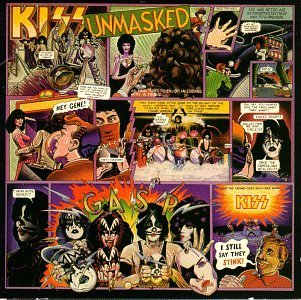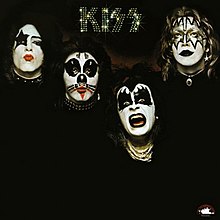
Kiss was an American rock band formed in New York City in 1973 by Paul Stanley, Gene Simmons, Ace Frehley, and Peter Criss. Known for their face paint and stage outfits, the group rose to prominence in the mid-1970s with shock rock-style live performances which featured fire-breathing, blood-spitting, smoking guitars, shooting rockets, levitating drum kits, and pyrotechnics. The band had gone through several lineup changes, with Stanley and Simmons remaining the only consistent members. The final lineup consisted of them, Tommy Thayer, and Eric Singer.

Paul Daniel "Ace" Frehley is an American musician who was the original lead guitarist, occasional lead vocalist and founding member of the rock band Kiss. He invented the persona of The Spaceman and played with the group from its inception in 1973 until his departure in 1982. After leaving Kiss, Frehley formed his own band named Frehley's Comet and released two albums with the group. He subsequently embarked on a solo career, which was put on hold when he rejoined Kiss in 1996 for a highly successful reunion tour.

Hotter than Hell is the second studio album by American hard rock band Kiss, released on October 22, 1974, by Casablanca Records. It was certified gold on June 23, 1977, having shipped 500,000 copies. The album was re-released in 1997 in a remastered version. It peaked on the Billboard 200 charts at No. 100, without the benefit of a hit single. Many of the album's songs were live staples for the band, including "Parasite", "Hotter than Hell", "Let Me Go, Rock 'n' Roll", and "Watchin' You".

Unmasked is the eighth studio album by American hard rock band Kiss, released on May 20, 1980, by Casablanca Records. It was their first not to feature original drummer and founding member Peter Criss. Despite having no involvement in its production, Criss features in the album's artwork and the video for "Shandi", and also receives credit.

Love Gun is the sixth studio album by American hard rock band Kiss, released on June 30, 1977. Casablanca Records and FilmWorks shipped one million copies of the album on this date. It was certified platinum and became the band's first top 5 album on the Billboard 200. The album was remastered in 1997 and again in 2014.

Dynasty is the seventh studio album by American rock band Kiss, produced by Vini Poncia and released on May 23, 1979, by Casablanca Records.

Creatures of the Night is the tenth studio album by American rock band Kiss, released in 1982. It was the band's last for Casablanca Records, the only label for which Kiss had recorded up to that point. The album was dedicated to the memory of Casablanca founder and early Kiss supporter Neil Bogart, who had died of cancer during the recording sessions. It is also the band's last album recorded with Ace Frehley credited as an official member and their first album with Vinnie Vincent, as the initially uncredited lead guitarist. Vincent would later be credited but not featured on the cover of the 1985 reissue of the album. It was also Kiss' last album to feature the band with their trademark makeup until the release of Psycho Circus in 1998.

"Beth" is a song by American rock band Kiss, originally released on their 1976 album Destroyer. Featuring drummer Peter Criss on lead vocals, the song was written primarily by producer Bob Ezrin and Stan Penridge. Criss contributed to the demo, "Beck" and is, therefore, listed as one of the writers. Casablanca Records released it as a single in August 1976, after it was released as the B-side of "Detroit Rock City". "Beth" is Kiss's biggest commercial hit in the United States; it reached #7 on the Billboard Hot 100, received a Gold Record certification from the RIAA, and won the 1977 People's Choice Award for "Favorite Song". In 2003, "Beth" ranked #3 in VH1's 25 Greatest Power Ballads.

"Rock and Roll All Nite" is a song by American rock band Kiss, originally released on their 1975 album Dressed to Kill. It was released as the A-side of their fifth single, with the album track "Getaway". The studio version of the song peaked at No. 69 on the Billboard singles chart, besting the band's previous charting single, "Kissin' Time" (#89). A subsequent live version, released as a single in October 1975, eventually reached No. 12 in early 1976, the first of six Top 20 songs for Kiss in the 1970s. "Rock and Roll All Nite" became Kiss's signature song and has served as the group's closing concert number in almost every concert since 1976. In 2008, it was named the 16th greatest hard rock song of all time by VH1.

Alive! is the fourth album overall, and the first live album, by American hard rock band Kiss, released on September 10, 1975. It is considered to be their breakthrough, and a landmark for live albums. The double-album contains live versions of selected tracks from their first three studio albums, Kiss, Hotter Than Hell and Dressed to Kill. It was recorded at concerts in Detroit, Michigan; Cleveland, Ohio; Wildwood, New Jersey; and Davenport, Iowa on May 16, June 21, July 20 and 23, 1975.
"Deuce" is a song by the American hard rock band Kiss, written by bassist and vocalist Gene Simmons. The song appeared on Kiss' eponymous 1974 debut album. In addition to being one of the band's most popular and most-covered songs, "Deuce" is a traditional concert opener. The song has appeared on many Kiss live and compilation albums.
The Destroyer Tour also known as The Spirit of '76 Tour was a concert tour by Kiss, in support of their fourth studio album Destroyer.

The Alive 35 World Tour was a 2008–2009 concert tour by Kiss to celebrate their 35th anniversary. It was the band's first major tour since the Rock the Nation World Tour in 2004. On the tour, Kiss played in Europe for the first time since the Psycho Circus World Tour in 1999. Kiss wore Destroyer-themed costumes for the tour, but the majority of the songs played were on Alive!. The tour was highly successful and proved to be Kiss's biggest tour of Europe. This tour marked the first time Kiss visited Bulgaria, Greece, Latvia, Russia, Luxembourg, Colombia, Peru and Venezuela.
Prentice John Delaney Jr., better known as Sean Delaney, was an American musician, producer, road manager and songwriter, best known for his work with the rock band KISS from the early 1970s until the early 1980s. He is largely credited with developing their choreography onstage, and co-wrote many songs with Paul Stanley, including "Mr. Speed", "Makin' Love", and "Take Me" from the 1976 album Rock and Roll Over, and "All American Man" from the studio side of the 1977 album Alive II.

"Nothin' to Lose" is a song by American hard rock band Kiss, released on their self-titled debut album in 1974. It is the first single the band had ever released and the first single off the album, with "Love Theme from KISS" as the B-side. Although the song failed to chart, it has remained a concert staple during the 1970s and was featured on many live albums and compilations.
"Firehouse" is a song by American hard rock band Kiss, released in 1974 on their eponymous debut album. The track was written by the bands' rhythm guitarist and vocalist Paul Stanley. During live performances, bassist Gene Simmons has breathed fire, with red lights flashing and sirens sounding. "Firehouse" has remained a concert staple and is regarded as one of the band's classic songs. With its fan-favorite status, the song is one of the most played songs in the Kiss catalog, having been played well over 1,000 times during their career.
The Hotter than Hell Tour was the second tour of the American rock band Kiss. The tour featured songs from their first album and their newly released second album, Hotter than Hell, which was the album that the tour was in support of. During this tour, the band used fire and the destruction of guitars as part of their show. The January 31, 1975, show in San Francisco was filmed and later made available for public viewing.
The Kiss Tour was Kiss' first album support tour. Sometimes known as the First Tour, it also encompassed several shows before and after the "official" dates.
"Cold Gin" is a song by the American hard rock group Kiss. The song was written by the band's lead guitarist Ace Frehley and was released in 1974 on the band's eponymous debut album. The song is featured on many compilations released by the band. Live versions of the song were often extended for about two minutes due to Frehley's soloing.
"Kissin' Time" is a song by the American rock and roll singer Bobby Rydell. It was released in 1959 on Cameo-Parkway Records. Written by Bernie Lowe and Kal Mann, the track was Rydell's first single and it would also go on to be his first Top 20 hit.












